Picture this.
You have successfully launched your business and, despite the normal ups and downs of being an entrepreneur, things are going really well.
Nevertheless, the idea of being able to save on taxes and other expenses that you could use to reinvest in your company is more than enticing.
So, you begin to investigate your options.
You discover that by taking your business offshore, you can legally save on taxes and, of course, the idea appeals to you. Who wouldn’t jump on an opportunity like that?
But then you discover something even better: not only can you take your business offshore but there are more than a few countries around the world that will offer you a second residence in exchange for setting up your business in their jurisdiction.
Here at Nomad Capitalist, we often discuss the many benefits of having a second residence. So, being offered residency for simply establishing your business in a country that is already more business-friendly than where you currently reside seems to be the ultimate win-win situation.
Before settling on any one country, however, it’s good to get a feel of the options that are available to you.
Some countries will require that you hire a specific number of locals, invest in only certain industries, or that you put a minimum amount of capital into a local bank business account.
Whatever your needs and preferences, we’ve done the homework for you. Below, you’ll find 16 countries where doing business and global living go hand in hand.
1. Belgium Business Visa

The Belgian business visa is difficult to obtain but highly desirable.
The heart of the European Union, Belgium is a country where you can incorporate a business and obtain residence and an eventual passport quite easily.
However, you should be aware that Belgium’s business visa is only an option if you genuinely want to set up and run a company there. In other words, putting a couple of hundred euros in a bank account there and forgetting all about it (much like you can do in Panama, for example) won’t cut the mustard.
What will be expected of you? Starting a real Belgian company with a thought-out business plan that will need to undergo a stringent approval process.
It’s not easy and foreign investors get rejected all the time. That’s because this is a highly desirable EU country and they can afford to get picky about the people they let in.
And with a real Belgian company come real taxes. The corporate tax rate is 25% (recently reduced) and if you want residence (along with all the perks that it offers), be prepared to pay.
So, given its tax rates, how is Belgium a smart financial move?
For starters, the business you would run in Belgium doesn’t need to be your main or primary business. You can structure your corporation in a way that you would only pay tax on your Belgian income, but not your global earnings.
Keep in mind, however, that if you want to continue living in Belgium, your business will need to turn a profit – this is a condition that your annual residency renewal depends upon.
Here are the other requirements to pull off Belgium residence and incorporation:
- Your company must have a college-educated director, which can either be you or someone else you hire.
- You must invest at least €6,200 upfront if you have a business partner, or €12,400 if you set up a company by yourself.
- You should expect to spend approximately €150,000 in the first year on your business, which includes processing fees, legal costs, property rental, and employee salaries.
- You should register as a tax non-resident if you don’t want to report or pay taxes on your foreign earnings in Belgium. You’ll need to demonstrate that the center of your social and economic life is outside of the country.
Other benefits of residency or citizenship in Belgium include that the country allows dual citizenship and Belgium only requires that you spend a few months per year in-country, as long as you spend at least some of your time elsewhere in Europe.
The quality of life in Belgium is very high and the country has a welcoming attitude towards other nationalities. Brussels is an international city and is at the heart of European business. Universities in Belgium are very internationally oriented and students can even follow courses in English.
All of this makes Belgium a prime location for anyone looking for a great place to live and do business in Europe.
You can read more about Belgian residence and citizenship here to further help you decide if the Belgium business visa should be on your list of offshore options.
2. Colombia Business Visa
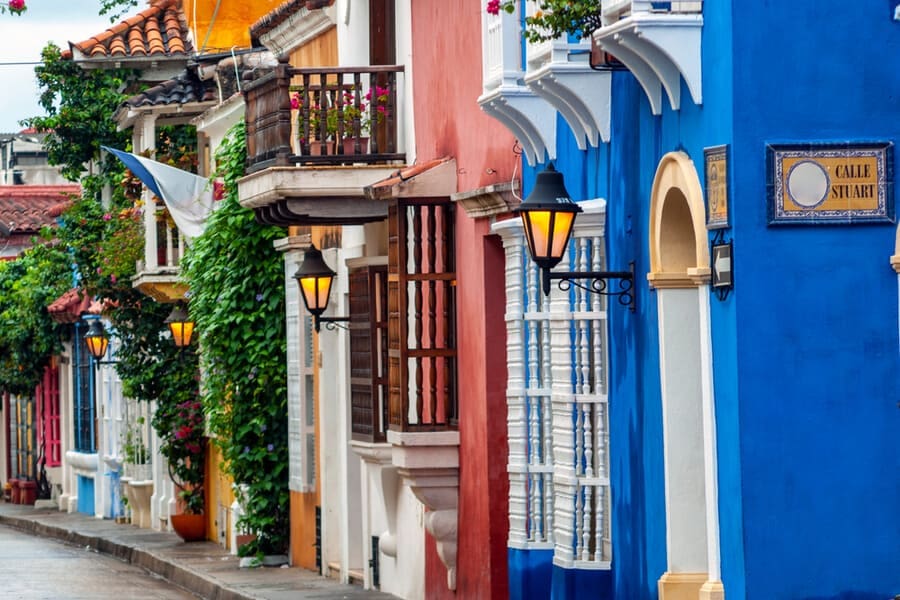
You may not have heard of Colombia’s business visa, but it is definitely worth your consideration for more than one reason.
One place you may have never considered is Colombia. While many still associate Colombia with its dark past battling drug lords, making that mistake now could lead you to entirely miss out on one of the strongest markets and most vibrant cultures in South America today.
Anyone looking to start a business can get the added benefit of a second residency in Colombia with as little as $20,000 in capital that you can spend immediately on your company.
This is called the Colombia Business Visa and it’s a temporary residence visa. You will need to visit the country at least once every six months to retain this visa.
If you would like to claim an immediate permanent residence in Colombia, instead, you’ll need to make an investment of $140,000 into any Colombian business.
Once residency is obtained, Colombia only requires that you visit the country at least once every two years in order to keep your residency active. If you meet that condition and a basic Spanish and Colombian history knowledge requirement, the timeline to naturalization is just five years.
A Colombian passport is much better than it used to be and will grant you visa-free access to over 125 countries. Besides having unlimited access to all of Central and South America, a Colombian passport will allow you visa-free access to all of the countries in Europe’s Schengen Area, as well as traditionally difficult countries like Russia.
Even better, Colombia also allows dual citizenship, meaning you will not have to renounce your current citizenship to become a citizen.
What makes Colombia really stand out as a destination for entrepreneurs, however, is its business culture. Colombia’s consistent economic stability over the past few years has been noticed by foreign investors and expats worldwide.
The country was named as one of seven emerging markets worth investing in by Fortune Magazine, and the World Bank has ranked it as one of the best economies in Latin America based on the short amount of time it takes to start a business there.
The start-up scene in Colombia has been moving forward at an impressive pace, thanks in part to the large number of engineering and computer science graduates and postgraduates in the country that afford entrepreneurs access to the second-largest skilled labor workforce in Latin America.
This growing technology ecosystem is further benefited by Colombia’s low taxes and great incentives, making Colombia a major competitor for offshore operations.
And then, of course, there is Colombia’s vibrant culture, beautiful people, breathtaking nature, good weather, great cost of living, organic and diverse food, the Amazon jungle, modern skyscrapers, pristine coastline, numerous museums, historic neighborhoods, modern shopping malls, sophisticated restaurants, electric nightlife, and so much more.
The list truly does go on. No wonder things are going so well for Colombia. You can learn more about Colombia’s residence and business visa program here.
3. Ireland Golden Visa

Ireland’s low taxes have been enticing businesses to its shores for decades now.
This business visa is for those of you who already have a business and likely fit the definition of an advanced entrepreneur with a larger corporation.
Due to its attractive 12.5% corporate tax, Ireland is home to pretty much any large company you can think of: Microsoft, Facebook, Google, LinkedIn, Dell, Boston Scientific, Kellogg’s, HP, and hundreds of others — they all go to Ireland.
So, if you’re looking for a low tax jurisdiction for your established business, this is it.
If you don’t need a huge salary from your company, you can set up shop in Ireland with at least €1 million, have very little corporate tax, live in a great jurisdiction, have access to all of Europe, qualify for residency, and be on track to get an Irish passport in five years.
Here are some quick facts about the Irish entrepreneur visa and Irish residence:
- Your personal wealth should be no less than €2 million (the assets of your spouse don’t count).
- The minimum required sum to invest in an Irish business is €1 million (can be a new or existing business). You can invest in a single or multiple businesses.
- It will take 3-4 months to become a resident of Ireland.
- You can bring your dependent family members to Ireland with you under the same investment.
- You must spend at least one day in Ireland each year, minimum.
- After 5 years in Ireland, you can apply to become an Irish citizen; dual citizenship is allowed.
- You can divest your funds after a period of 5 years and still retain your residence.
Your entrepreneur visa will be judged based on your personal profile, the commercial viability of your proposed business, the number of jobs likely to be created, and its overall impact on the Irish economy. So, it’s worthwhile to focus on those areas in your business plan.
And what about the country itself? Ireland is a great place to live and has one of the world’s best and most respected passports, offering visa-free travel to more than 185 countries, including the United States and Canada (the most difficult ones to gain access to).
If you are interested in obtaining an Irish passport but don’t have a large company to get your foot in the door, Ireland has a very open policy of granting citizenship to those whose family tree includes ancestors from Ireland.
You could take advantage of Irish citizenship by descent as an alternative to setting up a business there. The ancestry route is also much cheaper and faster if you can prove you have a parent or a grandparent who is or was Irish.
To sum it all up, we love Ireland. And for anyone who might worry about getting lonely living abroad, an English-speaking country like Ireland is the perfect solution. Plus, the Irish have a well-earned reputation for being some of the most friendly people in the world.
Add to that the country’s business-friendly policies and some of the lowest taxes in Europe, a straightforward residency and citizenship plan, and one of the highest levels of economic freedom in the world, Ireland truly is a place any entrepreneur should have on their list when considering taking themselves and their business offshore.
You can learn more about Ireland’s business visa here.
4. Panama Business Visa
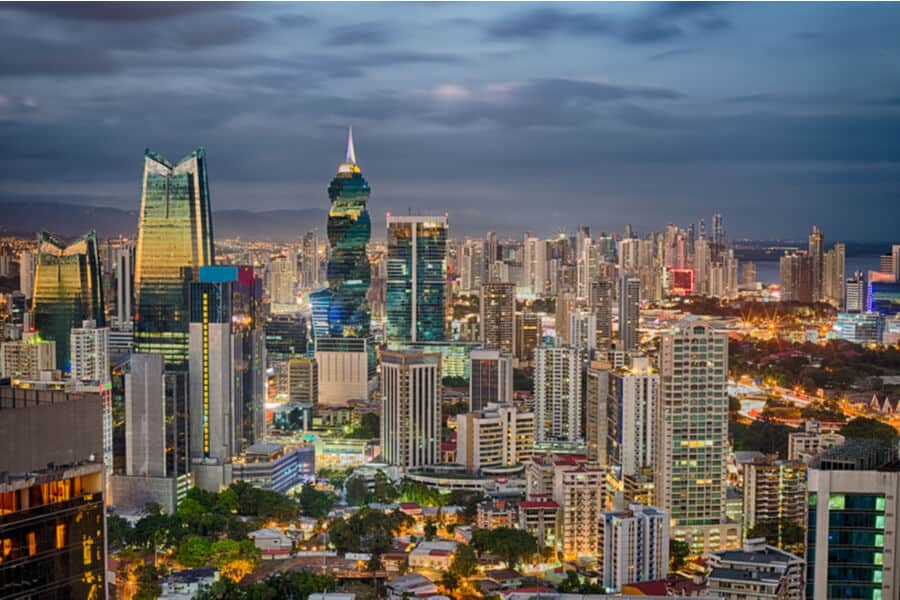
Even if you are not from one of the “Friendly Nations” that will qualify you for residence in Panama, you can still get a business visa with a larger investment.
Unlike Belgium, Panama is a much easier country in which to set up a business and get residency.
Company formation is a mere formality under Panama’s Friendly Nations Visa. Here are its formal requirements:
- You must be a national of one of the qualifying countries. Citizens of the US, most of the EU, as well as the most developed South American and Asian countries are included.
- You need to establish economic or professional ties with the Republic of Panama. More on this below.
- You’ll need to show proof of financial solvency. This is done by depositing $5,000 into a Panamanian bank account. To open up an account, you’ll need to provide bank and personal reference letters, a financial report, proof of business and personal income, and an ID document. Also, a letter from your lawyer explaining that you’re applying for the entrepreneur visa will need to be presented.
- You’ll provide the required documentation and pay all of the required fees. This is approximately $5,000 after you recover the mandatory $5,000 bank deposit once you obtain your visa.
Now, let us expand on the economic or professional ties’ requirement as that is the most crucial stipulation for this entrepreneur visa.
Essentially, this program doesn’t give you a minimum sum that you will need to invest, but that will depend on the deals that are available at any given moment.
We have seen deals starting at around $18,000, but they are often not as good as the more expensive investment options. You can invest in an already existing business (except retail) or form your own offshore company if you would prefer.
The latter is a particularly attractive option if you’re already in possession of an online business, have an investment portfolio, are a trader, or simply need an offshore company for one reason or another. Panama isn’t a bad place to incorporate.
The main point for the Friendly Nations Visa is that you must have controlling ownership in the company via your investment. Plus, you’ll need to have three managers set up for the company.
And although you’re legally required to prove that it’s not a dormant business, officials regularly ignore this requirement and renew visas anyway.
However, we wouldn’t recommend that anyone form a Panamanian company just to get residence. And if it doesn’t fit into your overall financial and personal plan, you can always set up the company, get Panamanian residence, then dissolve the entity and move on.
You can read more about Panama’s Friendly Nations visa here.
An alternative to the Friendly Nations entrepreneur visa, Panama also has the Business Investor visa.
Here are the requirements:
- The minimum investment amount is $160,000 and that has to be put into a Panamanian company or a new one needs to be established with those funds.
- Your new venture should create at least 5 full-time jobs for Panamanians.
- This visa is renewable after 2 years, which is when you can request permanent residence.
- After 5 years of permanent residence, you can apply for naturalization. You’ll need to have Spanish language skills, knowledge of Panamanian history, and attend an interview. The process of naturalization takes 3 years, on average.
5. Portugal Golden Visa

Portugal’s entrepreneur visa is one of the most overlooked aspects of the country’s Golden Visa program.
Portugal’s Golden Visa program has been one of the most popular European residence by investment programs for a while now. Competitive pricing, red tape that was cut to the bare minimum, and a high standard of living are all Portugal’s main selling points.
A major part of this Golden Visa program is the entrepreneur route, which is one of the most overlooked aspects of investing in Portugal.
This entrepreneur route entitles one to a Portuguese residence permit, renewable twice in a five-year period. Thereafter, you can apply for Portuguese citizenship, making Portugal one of the fastest ways to obtain European citizenship by investment.
Here are the key points of the entrepreneur visa in Portugal:
- Create at least 10 jobs in Portugal.
- Register each of your employees in the Portuguese Social Security system (paying 23.75% of their gross wages in tax).
- There is no minimum investment sum.
- The program is best suited to those who have a medium to large size business that’s growing and that can take on 10 employees over a period of 6 years.
- It’s also great for those who want to relocate (a part of) their business abroad, but don’t want to spend any time abroad themselves.
- You can get your spouse and any dependent children the same residence perks under the same investment.
- Approximately $7,000 in fees will need to be paid when you apply for Portugal’s entrepreneur visa.
- You must be a third-country national to qualify (EU citizens are excluded).
The corporate tax rate stands at 21% in Portugal and hasn’t risen for a good few years. Meanwhile, the personal income tax rate is an eye-watering 48%, but if you structure your finances right, you can skip having to pay that by becoming a non-habitual resident.
And even though the labor isn’t exactly the cheapest in this southern European country when compared to some of the Eastern European nations like Moldova or Ukraine, it could still be the right option for some entrepreneurs and businesses.
Another thing about the Portuguese entrepreneur visa is that you don’t have to live in the country, nor do you need to move your entire business to the Iberian peninsula to obtain residence.
Just having a part of your business operations located in Portugal would suffice. And, you’d only have to spend 7 days a year in Portugal to be able to retain your residence permit.
Overall, this program is not as easy to obtain and maintain as say, Panama’s.
Portugal offers all the perks of an EU country and the benefits associated with that, and it’s also one of the fastest ways to obtain a Tier A passport. Expect to jump through hoops and pay way more in fees than in other non-EU countries when going the business visa route.
Read more about Portugal’s Golden Visa here.
6. Hungary Business Visa
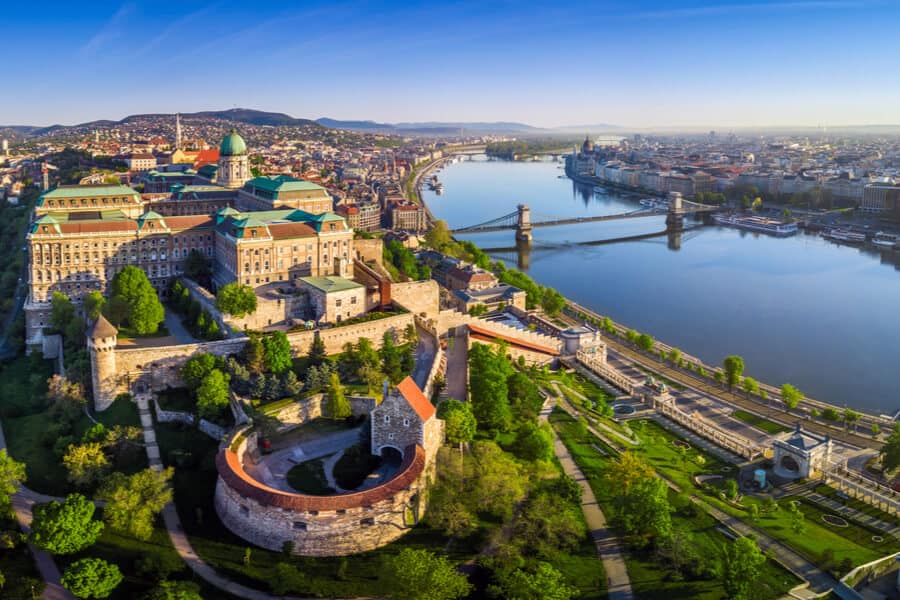
Hungary’s business visa is an attractive option for entrepreneurs from many different backgrounds.
Hungary is a country in the European Union that’s extremely welcoming when it comes to foreign investment, especially when it comes to setting up new businesses.
With a workforce that is highly educated and that speaks English proficiently, plus its many industrial sites, Hungary is most suited to those business owners who are looking to set up manufacturing businesses and similar enterprises.
With a central location in a rapidly emerging area of Europe, the Hungarian business visa looks even more appealing.
Here are the key points of the program:
- Non-EU nationals can obtain Hungarian residence by establishing a local company.
- The minimum amount required for initial business capitalization is €50,000.
- Don’t forget about the legal and professional fees of approximately €30,000 that will be charged when you set up a Hungarian company.
- You’ll need to provide proof that you’ve legitimately obtained all of the funds necessary for the investment.
- A clean criminal record and an outstanding international standing both need to be proved.
- You’ll initially be granted temporary residence for 1 year; this can be extended for another 2 years. Subsequently, you’ll be granted permanent residence for 5 years, provided you maintain the business investment.
Overall, we would say the Hungarian business visa offers much better value for your money than the aforementioned Portuguese program if it matches your business size and needs.
And if you turn a profit on your business, it can help you equalize the mandatory social security contributions and the other taxes that you’d be liable to pay on your business in Hungary.
For example, the Hungarian corporate tax rate is currently 10%, which makes it an appealing jurisdiction in which to set up shop.
So, what are some of the main benefits of Hungarian residence? For starters, being a resident in this country will enable you to invest in any EU country freely, open up bank accounts, as well as purchase real estate. This is great news for your portfolio diversification.
Furthermore, you can apply for citizenship once you’ve been a resident for a period of eight years. That doesn’t guarantee you’ll get it, but if you do get approved, you’ll get your hands on a highly valuable European passport.
So, what are you waiting for? Huge swathes of expats have already uncovered Hungary – and Budapest specifically – as a great place to live. We’ve listed it as one of our favorite cities in Europe.
If you can handle cold winters (the thermal spas dotted all around Budapest help a lot), this country could be a great place to obtain residence and grow your business.
An alternative to setting up a business in Hungary is obtaining Hungarian citizenship by descent if you have Hungarian ancestry.
7. Turkey Citizenship by Investment

You can skip the business visa and go straight to citizenship by starting a business and hiring at least 50 people in Turkey.
As part of its citizenship by investment (CBI) program, Turkey has two offers for foreign investors. Either you opt to invest in real estate or you invest in a local business.
While the vast majority go for the real estate option (and there are definitely great property deals to be had), the entrepreneurship route could be interesting to (aspiring) business owners.
The main point of this route is to create jobs.
It doesn’t matter if you want to move a part of your already existing business to Turkey, or if you want to set up a brand new operation, you’ll need to meet this program’s requirements:
- Create at least 50 jobs for Turkish citizens. The total employee cost of one minimum salaried job is $505.
- All of the administrative costs of setting up and running a business should also be considered, although there is no exact number as to how much that will be during the first and the subsequent years.
- Only people interested in running a legitimate business for the long-term should apply. You’ll need to either run the business yourself or hire someone to do so for you.
- There is no predefined minimum investment sum to qualify for residence and eventual citizenship in Turkey under this program.
- You don’t need to physically reside in Turkey to take advantage of this entrepreneur program.
- Bringing your family under the same investment is entirely possible; your spouse and dependent children are free to join you in obtaining residence and a Turkish passport.
All in all, if you’ve always wanted to set up a company abroad and your business could benefit from affordable Turkish labor, or if you need to outsource some of your current operations to a cheaper country, Turkey could be what you’re looking for.
The entire process of getting Turkish citizenship by investment in a business takes about three to four months and is rather easy.
That said, we would still recommend you have professional help to guide you through the legal processes of incorporating a Turkish business.
Read more about citizenship by investment in Turkey here.
8. Lithuania Business Visa
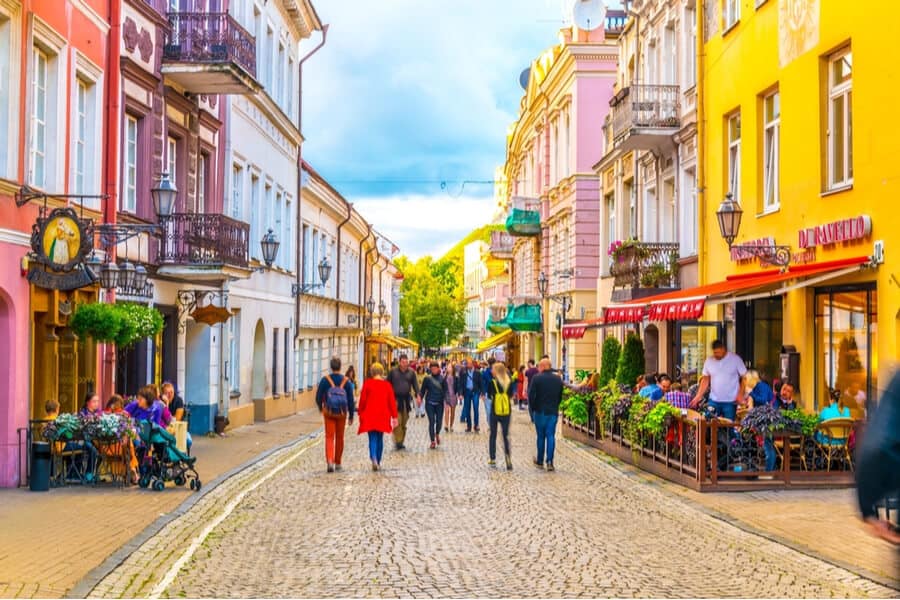
This Baltic country is more than pure charm – corporate tax rates are also relatively low, making Lithuania’s business visa even more appealing.
Lithuania is yet another European country where you can set up a business and get residence in exchange — it’s as easy as that.
In fact, Lithuanian residence by way of investing in a business is one of the easiest to obtain in Europe, with no excessive requirements and not that much red tape either.
However, we wouldn’t recommend Lithuania for just any kind of business. If you would like to run a service-based business or something in retail, we don’t see much potential in this Baltic country.
The best way forward is to think regionally or globally; you would be best off if you offer professional or business-to-business (B2B) services to companies in the region or in Europe in general.
Of course, location-independent companies can also benefit from being located in Lithuania, thanks to the country’s flat 15% corporate tax. That’s comparable to Ireland’s 12.5%.
Plus, while Lithuania’s neighbor Latvia requires that you pay thousands in taxes every year to keep your residence permit active, Lithuania takes a more relaxed approach and doesn’t track the numbers that closely.
As long as it’s clearly an active company and you pay some tax annually, you’ll be able to continue to enjoy the benefits that a Lithuanian residence offers.
Interested? You’ll be glad to know that the process is actually very simple:
- Set up a bank account and deposit a minimum of 3,000 euros. There are plenty of local lawyers who can incorporate your business for you for a small fee.
- You will need to have some aspect of your personal or financial life “center in Lithuania.” While many construe this as needing to live in the country, the officials are flexible in most cases. For example, a lease agreement should suffice to keep your residency active.
- You should visit the country once every 6 months.
- Citizenship is available to those who have resided in Lithuania for a minimum of 5 years. However, you should keep in mind that the country doesn’t allow dual citizenship in most cases.
Read more about starting a business in Lithuania here.
9. The UK Tier 1 Visa

If you have the right idea, you could qualify for the UK Tier 1 visa and be doing business amidst this stunning skyline.
The UK is a country that’s unmatched by any other in many ways. Its cultural and historical richness, the quality of life, and the freedom that it offers its citizens and residents are top-notch.
No wonder, then, that it’s one of the top three residence by investment countries in the world. In fact, it wrestles for the most popular European Golden Visa with Portugal.
So, what does the UK have to offer entrepreneurs?
Quite a lot, as it turns out. There are two ways to gain temporary and subsequently permanent residence in the UK, all of which fall under the Tier 1 visa.
First, you can go the innovator route, which is all about having lots of business experience. You must be interested in setting up and running a legitimate business in the UK and you must have at least £50,000 to invest in it.
Here are some more requirements:
- Your idea must be new, innovative, and viable. An officially recognized organization will need to evaluate your detailed business plan and make a recommendation to either endorse your business or not.
- You need to prove you’ll be able to support yourself and your family in the UK. There is no definition of the funds that you need to have, but you need to demonstrate that you’ll be able to meet your needs sufficiently and not draw on the social security system of the country.
- Finally, you need to speak English at the B2 level, at least. The UK Tier-1 Visa isn’t for someone from a third country who has no interest in assimilating into the society.
Secondly, there is the Start-up route — ideal for those who have a creative idea for a new business and would like to develop it and bring it to fruition in the United Kingdom.
It’s very similar to the innovator route because you will need to prove that you can speak English and that you can support yourself (and your family, if applicable) when you apply. However, the one thing that differs is there is no predefined sum of money that you need to invest in your start-up.
The start-up selection process is very rigorous and you’ll need to have a bullet-proof business launch and development plan.
The government is also looking to see whether your idea could become the next Facebook or Netflix. Basically, the benefit to the British economy needs to be considerable for them to grant you temporary residence.
No, the start-up visa won’t lead to permanent residence, nor can it be a way to obtain British citizenship. Once your business is up and running, and doing really well, you’ll need to apply for another visa, e.g. the one for innovators, to be able to extend your stay in the country.
Read more about starting a business or running a start-up in the UK with the Tier 1 visa here.
10. Latvia Golden Visa
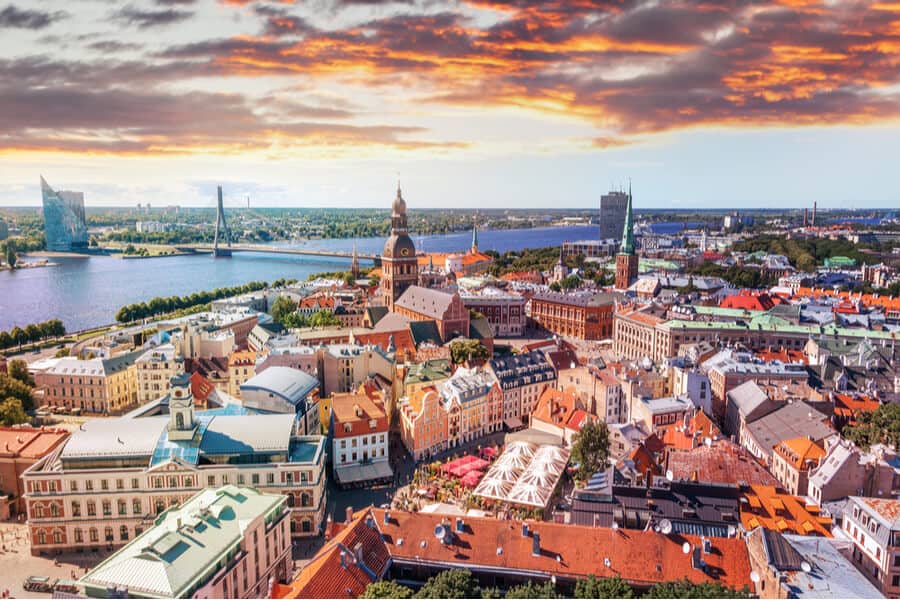
Latvia’s business visa is relatively low-cost until you factor in the tax requirements.
A neighbor of the aforementioned Lithuania, Latvia is another Baltic country that has a pretty interesting proposition for entrepreneurs looking for European residence.
So, what’s the main appeal of Latvia? Here are the highlights:
- Efficient application process. You’ll gain residence in 2-3 months.
- It’s one of the cheapest ways to gain European residence for business investors. You’ll need to invest only €50,000 if the company turnover is less than €10 million a year. The investment will need to be double if the company earns more than that.
- You’ve got choices. You can either create your own company or you can invest in an already existing Latvian company and become a shareholder.
Beyond these key points of Latvian residence by business investment, there are a few quirks as well.
The main catch is that if you form a company, you must pay at least €40,000 in tax per year to retain your residence.
If you do the math, the total investment for a period of five years, for example, is a minimum of €250,000. And, suddenly, Latvia is no longer a ‘dirt cheap’ proposition.
Still, lots of investors choose to go the business investment route in Latvia. Over 40% opt in because a €50,000 investment to bring your entire family to Europe is a good price to pay.
And, if you’re running a legitimate business with a decent turnover, the €40,000 in annual tax shouldn’t be a hard feat.
Read more about starting a business in Latvia here.
11. Singapore EntrePass Visa

Singapore’s EntrePass Visa is much more difficult to obtain these days.
Singapore is a notoriously hard country in which to get residence. It simply has an overabundance of investors, expats, and internationals of all varieties to feel the need to welcome just anyone.
However, for many foreign entrepreneurs, the lure of Singapore is simply too strong to resist. Luscious food, a multicultural environment, and a central Asian location are the main benefits to setting up shop in this Asian nation.
Plus, it’s one of the best residences (and eventual citizenships) to have in the world. In addition to an exceptionally strong passport, it also has territorial taxation which means that you can structure your global assets in ways that benefit you directly. However, Singapore does not allow dual citizenship.
So, what does an entrepreneur do to gain permanent residence in Singapore? We can’t lie and tell you the process is quick or cheap.
Quite the contrary.
You used to be able to open up an ice-cream shop, employ a few locals, claim their permanent residence, and call it a day. Not anymore.
The requirements are much more stringent now for each of the three routes into the country.
First, you’ve got the Singaporean entrepreneurship visa called the EntrePass. Here are the main eligibility criteria:
- People of any nationality can apply.
- The program is geared towards serial entrepreneurs, high-caliber innovators, and experienced investors only. No beginners will be accepted.
- You must either already have a new company (less than 6 months since incorporation) or intend to set one up after you’re approved for the EntrePass.
- It will take approximately 2 months to process your application.
And whereas there is no minimum sum that you must have to start your Singapore company, there is a checklist of criteria. The more of these you tick off, the higher your chances of getting approved:
- You have secured at least $100,000 in funding from a government-recognized venture capitalist (VC) or business angel.
- You’re an incubatee at a government-approved incubator or accelerator.
- You have a vast business network and an entrepreneurial track record.
- You hold intellectual property that delivers a significant competitive advantage to your business.
- You have a research collaboration with the Institute of Higher Learning or another research institute in Singapore.
- You have achieved exceptional things in your area(s) of expertise, and are able to prove it.
- You have a positive track record of investing in businesses.
If you get approved, you’ll need to jump through a considerable amount of hoops to renew your residence annually, including meeting an annual spending sum figure and employing a minimum amount of people.
Don’t fancy having to do all that? Then your second option to gain entry to Singapore is the Employment Pass.
While this program is mostly geared towards skilled workers, you can set up a company and hire yourself as the director.
Keep in mind that:
- It’s not cheap to run Singaporean companies. Local directors must be hired and an annual audit must be conducted.
- Singapore is no tax haven. All businesses pay 17% tax on their worldwide income. You’ll be expected to show a business profit, which will also be taxed.
- You must pay yourself a salary of about $100,000. This will be subject to local income and social security taxes.
Finally, there is another relatively new program that can lead to residence in Singapore called Tech.Pass. It’s very similar to EntrePass but is geared towards leaders and innovators within the tech industry.
So, it’s up to you to pick from these three options and to make your Singapore business and residence a reality. As always, the Nomad Capitalist team can help you navigate the process.
Read more about setting up a business in Singapore here.
12. South Korea D-8 Investor Visa

South Korea has been gaining a greater presence on the world stage in recent years.
South Korea is a country that is not just heating up; it’s probably the hottest country on the Asian continent right now.
Its music, its food, and its culture, in general, is something that has exploded onto the global stage in recent years. South Korea has gone from being just another place that would export its laborers to richer nearby countries to being an economic powerhouse exporting its culture, technology, and cars.
There’s little wonder that investors have been looking towards this eastern Asian country and seeking to find out whether they can get a slice of that economic success pie.
Luckily, there is an opportunity for foreigners to get permanent residency in South Korea if they’re looking to invest in a local business.
However, it’s not as easy as it was just a decade ago. You used to be able to invest $25,000, fake setting up a business, and reside in the country permanently.
Now, as the number of expats in South Korea tops 1 million, residence permits are much harder to come by.
The visa is called the D-8 Investor visa and it requires a minimum investment of approximately $270,000. It will also need to be an actual profit-generating company for your residence permit to get extended.
The South Korean program is somewhat of a hybrid visa as it combines investment and entrepreneurship.
This means that your business doesn’t need to be as innovative as for, say, the UK or the Singapore business visas. You could open up a restaurant or some sort of a lifestyle business and thrive in South Korea.
Meanwhile, if you have an earth-shattering start-up idea that you think you could use to conquer the world, we would recommend taking it elsewhere. Since countries are wrestling for people to bring these ideas to them instead of their neighbors, you need to play your cards right.
Read more about investing in business in South Korea here.
13. North Macedonia Entrepreneur Visa

Besides Turkey’s citizenship by investment, the North Macedonia business visa is the quickest path to citizenship on this list.
The North Macedonian entrepreneur visa program is so under the radar that the government bureaucrats don’t even have a set procedure for it.
That often makes for the best investment opportunities — ones that haven’t already been seized upon by thousands upon thousands of investors from around the world.
Despite its visa program being quite unknown, the country itself has been gaining traction over the last decade. It’s a beautiful country in the Balkan peninsula, dotted by mountains and the pristine waters of Lake Ohrid.
So, what does it have in store for entrepreneurs?
For starters, North Macedonia has a special EU status as it has applied to join and its accession to the union is in progress. While there still remains a long road for North Macedonia to become a fully-fledged member of the EU, its citizens and residents do have visa-free access to the entire union.
And when it comes to obtaining a passport, North Macedonia is one of the fastest countries in the world to let you do that. Within a few years, you could not just have residence in the country but citizenship as well.
But don’t forget the business investment aspect of this. While North Macedonia is a slightly more obscure country on this list and you would assume that it would give you some concessions, they will actually expect you to run a legitimate business.
You will need to have a presence “on the ground,” form a company, as well as put at least €400,000 into a local business bank account. Furthermore, you’ll need to hire ten local people full-time.
All that said, it shouldn’t be a problem if you’re genuinely interested in taking advantage of the many opportunities that this emerging country offers, one that is among the most business-friendly countries in Eastern Europe.
Its tax regime is also highly favorable, with a flat 10% corporate tax.
All in all, setting up shop might take some time and quite a bit of research, but if you’re set on giving North Macedonia a go, we’re sure it will be worth your while. We can also deal with the bureaucracy on your behalf – feel free to reach out to the Nomad Capitalist team.
Read more about operating a business in North Macedonia here.
14. Bulgaria Business Visa
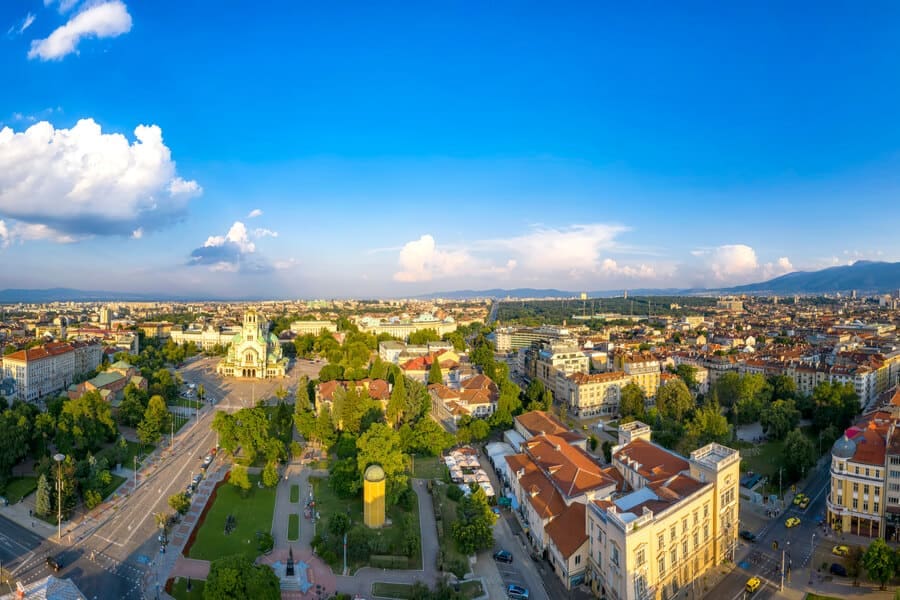
Bulgaria’s business visa is a solid alternative to it’s residence and citizenship by investment program.
Did you know that Bulgaria is a member of the European Union and the Schengen zone? Did you know that Bulgarian residence could mean you’re free to traipse all over the continent, with just an ID card?
If you’re eager to unlock Europe and are willing to give Eastern Europe a chance, Bulgaria is as good a place as any.
Sitting at the confluence of the west and the east, the new and the old (ex-Soviet), Bulgaria is a really interesting proposition for foreign investors seeking to reap the benefits of its EU status, affordable labor, and its geographic location, among others.
We wouldn’t necessarily recommend going for citizenship by investment in Bulgaria, as that will cost you at least half a million euros and take years.
Similar benefits of the passport can be had with just a residence and, luckily, entrepreneurs are in an enviable position as they can basically be fast-tracked to permanent residence status in a matter of a few months.
Bulgaria is great for those who want to outsource all or part of their labor overseas. That’s because the Bulgarian workforce is highly educated, most young people speak fluent English, and the average wage in the capital of Sofia is about a thousand euros per month.
If you were considering Portugal before, but that seemed a touch too expensive, then you can’t go wrong with Bulgaria.
This country should be of particular interest to those in the tech industry. Tech has been booming in Bulgaria and there are plenty of highly qualified specialists for hire.
Read more about running a business in Bulgaria here.
15. Romania Business Visa

Romania has a highly-skilled workforce, especially when it comes to tech.
A neighbor to Bulgaria, Romania is a very similar proposition.
You can get residence and perhaps even a second passport by incorporating a business in Romania, but then again, many European countries offer that.
So, what’s special about Romania in particular?
It’s a quick and relatively cheap way to obtain permanent European residence. You will need to invest a minimum of 150,000 euros into your company and hire some employees to get going.
The undefined number of employees makes Romania a better choice for those who aren’t necessarily in need of 10 or more employees (such as the requirement in Bulgaria).
When it comes to tax, Romanian corporations pay profit tax on their worldwide income – that’s a flat 16% in Romania. And while that’s quite a low percentage, it’s certainly not as low as some of the other jurisdictions in Europe.
The important take-away for running a tax-optimized business is to use a “micro company” — this isn’t exactly easy to pull off for non-residents, so we recommend having professional guidance along the way.
Any company with a turnover of less than 1 million euros in the preceding year would qualify to pay reduced tax rates between 1-3%. There is also a dividend tax of 5% that needs to be paid, but it’s a far cry from what Western Europeans are paying.
So, what sort of a business should you create in Romania?
As there are certain limits to what types of companies can claim tax benefits, we would say that the ideal business to run in Romania is product-based with healthy margins and the need to hire staff locally.
Read more about opening a business in Romania here.
16. Puerto Rico Act 60

Because of its special relationship with the United States, Puerto Rico offers a unique option for US business owners looking to lower their taxes.
Long-lauded as the ultimate alternative to citizenship renunciation for Americans who are oh-so-tired of inflated tax rates, Puerto Rico offers many opportunities to invest in business.
But tread carefully, it’s not the right option for all people.
It’s not a “one-size-fits-all” solution and going to Puerto Rico for residence and to do business does come with strings attached.
Additionally, it’s really not the best of locations for top-level living. With huge unemployment rates and nearly half of the population living under the poverty line, Puerto Rico is an option that should be weighed carefully.
Scrambling to raise capital, Puerto Rico has done what a lot of other governments have had to do — launch an investment program in exchange for tax incentives and residence status.
Their main goal is to attract US corporations that are looking to legally optimize their taxes. And because Puerto Rico has a special status with the US, companies are able to cut their tax by as much as 90%.
Your company will most likely need to have a physical office on the island, apply for all the tax concessions, and go through the bureaucratic motions.
But, for many, it’s still worth it.
Many Puerto Ricans speak English and the island is just a quick plane ride away from many American cities. Also, you don’t have to renounce your American citizenship to take advantage of the various tax incentives.
On the other hand, the physical presence requirement for yourself (and your family, potentially), puts many people off of life in picturesque Puerto Rico.
Could you see yourself spending half of your year there? If not then Puerto Rico may not be for you.
If so, then read more about Puerto Rico’s tax incentives here.
Source: https://nomadcapitalist.com/2021/03/10/business-visas-global-entrepreneurs-guide/
